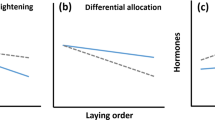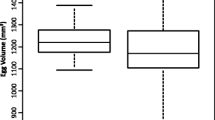Abstract
The impacts that helpers have on offspring in cooperative breeding systems depend on parental responses to help. However, the vast majority of investigations into parental responses to the presence of helpers have considered investment responses during a single phase of breeding—offspring provisioning. Whether or not responses during other phases of breeding complement those during offspring provisioning is therefore unclear. Here, we use temperature probes in model eggs of chestnut-crowned babblers (Pomatostomus ruficeps) to determine: (a) maternal responses to helpers, which (like partners) allofeed incubating females but do not share incubation; and (b) the implications of these responses for egg temperatures. We found that during incubation, increased helper number was associated with longer bouts of incubation interspersed with fewer foraging bouts, which resulted in greater nest attentiveness overall. Further, although helpers had limited effects on average egg temperatures, they were associated with reduced variation in egg temperatures. This reduced variation arose because helpers were associated with higher minimum egg temperatures during off-bouts, presumably because of the negative association between helper number and off-bout number. Together, these results suggest that helpers have additive effects on maternal incubation schedules, which contrasts markedly from the dramatic declines in offspring provisioning shown by mothers with helpers during the nestling phase. Further studies are required to assess the generality of these contrasting patterns and their implications for the quantification of helper effects in cooperative breeders.
Significance statement
Maternal responses to the presence of helpers are thought to be species-specific, but most tests are only conducted during offspring provisioning. Using temperature probes in model eggs of cooperative chestnut-crowned babblers (Pomatostomus ruficeps), we show that mothers increase contributions to incubation in the presence of helpers, resulting in more constant egg temperatures. This response contrasts markedly with maternal responses to helper presence during nestling provisioning in this system, suggesting that maternal response rules differ across distinct phases of breeding.


Similar content being viewed by others

Data availability
The datasets analysed during the current study are included as electronic supplementary material (“Cones et al. Data.xlsx”).
References
Ardia DR, Pérez JH, Chad EK, Voss MA, Clotfelter ED (2009) Temperature and life history: experimental heating leads female tree swallows to modulate egg temperature and incubation behaviour. J Anim Ecol 78:4–13. https://doi.org/10.1111/j.1365-2656.2008.01453.x
Barr DJ, Levy R, Scheepers C, Tily HJ (2013) Random effects structure for confirmatory hypothesis testing: keep it maximal. J Mem Lang 68:255–278. https://doi.org/10.1016/j.jml.2012.11.001
Bates D, Maechler M, Bolker B, Walker S (2015) Fitting linear mixed-effects models using lme4. J Stat Softw 67:1–48. https://doi.org/10.18637/jss.v067.i01
Bourne AR, Ridley AR, McKechnie AE, Spottiswoode CN, Cunningham SJ (2021) Dehydration risk is associated with reduced nest attendance and hatching success in a cooperatively breeding bird, the southern pied babbler Turdoides bicolor. Conserv Physiol 9:coab43. https://doi.org/10.1093/conphys/coab043
Browning LE, Patrick SC, Rollins LA, Griffith SC, Russell AF (2012b) Kin selection, not group augmentation, predicts helping in an obligate cooperatively breeding bird. Proc R Soc Lond B 279:3861–3869. https://doi.org/10.1098/rspb.2012.1080
Browning LE, Young CM, Savage JL, Russell DJF, Barclay H, Griffith SC, Russell AF (2012a) Carer provisioning rules in an obligate cooperative breeder: prey type, size and delivery rate. Behav Ecol Sociobiol 66:1639–1649. https://doi.org/10.1007/s00265-012-1419-z
Capp E, Liebl AL, Cones AG, Russell AF (2018) Advancing breeding phenology does not affect incubation schedules in chestnut-crowned babblers: opposing effects of temperature and wind. Ecol Evol 8:696–705. https://doi.org/10.1002/ece3.3524
Chalfoun AD, Martin TE (2007) Latitudinal variation in avian incubation attentiveness and a test of the food limitation hypothesis. Anim Behav 73:579–585. https://doi.org/10.1016/j.anbehav.2006.09.010
Chappell MA, Buttemer WA, Russell AF (2016) Energetics of communal roosting in chestnut-crowned babblers: implications for group dynamics and breeding phenology. J Exp Biol 219:3321–3328. https://doi.org/10.1242/jeb.144972
Cockburn A, Sims RA, Osmond HL, Green DJ, Double MC, Mulder RA (2008) Can we measure the benefits of help in cooperatively breeding birds: the case of superb fairy-wrens Malurus cyaneus? J Anim Ecol 77:430–438. https://doi.org/10.1111/j.1365-2656.2007.01351.x
Cones AG, Liebl AL, Houslay TM, Russell AF (2021) Temperature-mediated plasticity in incubation schedules is unlikely to evolve to buffer embryos from climatic challenges in a seasonal songbird. J Evol Biol 34:465–476. https://doi.org/10.1111/jeb.13743
Conway CJ, Martin TE (2000) Evolution of passerine incubation behavior: influence of food, temperature, and nest predation. Evolution 54:670–685. https://doi.org/10.1111/j.0014-3820.2000.tb00068.x
Cooper C, Mills H (2005) New software for quantifying incubation behavior from time-series recordings. J Field Ornithol 76:352–356. https://doi.org/10.1648/0273-8570-76.4.352
Cresswell W, Holt S, Reid JM, Whitfield DP, Mellanby RJ, Norton D, Waldron S (2004) The energetic costs of egg heating constrain incubation attendance but do not determine daily energy expenditure in the pectoral sandpiper. Behav Ecol 15:498–507. https://doi.org/10.1093/beheco/arh042
Deeming DC (2002) Behaviour patterns during incubation. In: Deeming DC (ed) Avian incubation: behaviour, environment, and evolution, 13th edn. Oxford University Press, New York, pp 63–87
DuRant SE, Hopkins WA, Hepp GR, Walters JR (2013) Ecological, evolutionary, and conservation implications of incubation temperature-dependent phenotypes in birds. Biol 88:499–509. https://doi.org/10.1111/brv.12015
Emlen ST, Wrege PH (1991) Breeding biology of white-fronted bee-eaters at Nakuru: the influence of helpers on breeder fitness. J Anim Ecol 60:309–326. https://doi.org/10.2307/5462
Haftorn S, Reinertsen RE (1985) The effect of temperature and clutch size on the energetic cost of incubation in a free-living blue tit (Parus caeruleus). Auk 102:470–478. https://doi.org/10.1093/auk/102.3.470
Hatchwell BJ (1999) Investment strategies of breeders in avian cooperative breeding systems. Am Nat 154:205–219. https://doi.org/10.1086/303227
Hollén LI, Bell MB, Radford AN (2008) Cooperative sentinel calling? Foragers gain increased biomass intake. Curr Biol 18:576–579. https://doi.org/10.1016/j.cub.2008.02.078
K Lisa Yang Center for Conservation Bioacoustics (2022) Raven pro: interactive sound analysis software (version 1.6.3) [Computer software]. The Cornell Lab of Ornithology, Ithaca, NY https://ravensoundsoftware.com
Koenig WD, Dickinson JL (eds) (2016) Cooperative breeding in vertebrates: studies of ecology, evolution, and behavior, 1st edn. Cambridge University Press, Cambridge, UK
Koenig WD, Walters EL (2012) Brooding, provisioning, and compensatory care in the cooperatively breeding acorn woodpecker. Behav Ecol 23:181–190. https://doi.org/10.1093/beheco/arr172
Koenig WD, Walters EL (2015) Temporal variability and cooperative breeding: testing the bet-hedging hypothesis in the acorn woodpecker. Proc R Soc B 282:20151742. https://doi.org/10.1098/rspb.2015.1742
Matysioková B, Remeš V (2014) The importance of having a partner: male help releases females from time limitation during incubation in birds. Front Zool 11:24. https://doi.org/10.1186/1742-9994-11-24
Mortensen JL, Reed JM (2018) Parental incubation patterns and the effect of group size in a Neotropical cooperative breeder. Auk 135:669–692. https://doi.org/10.1642/AUK-17-236.1
Nomano FY, Browning LE, Savage JL, Rollins LA, Griffith SC, Russell AF (2015) Unrelated helpers neither signal contributions nor suffer retribution in chestnut-crowed babblers. Behav Ecol 26:986–995. https://doi.org/10.1093/beheco/arv023
Nomano FY, Savage JL, Browning LE, Griffith SC, Russell AF (2019) Breeding phenology and meteorological conditions affect carer provisioning rates and group-level coordination in cooperative chestnut-crowned babblers. Front Ecol Evol 7:423. https://doi.org/10.3389/fevo.2019.00423
Nord A, Williams J (2015) The energetic costs of incubation. In: Deeming CD, Reynolds JS (eds) Nests, eggs, and incubation: new ideas about avian reproduction. Oxford University Press, Oxford, pp 152–170. https://doi.org/10.1093/acprof:oso/9780198718666.003.0013
Pearse AT, Cavitt JF, Cully JF Jr (2004) Effects of food supplementation on female nest attentiveness and incubation mate feeding in two sympatric wren species. Wilson Bull 116:23–30 https://www.jstor.org/stable/4164623
Portelli DJ, Deborah HB, Russell JF, Griffith SC, Russell AF (2009) Social organisation and foraging ecology of the cooperatively breeding chestnut-crowned babbler (Pomatostomus ruficeps). Emu 109:153–162. https://doi.org/10.1071/MU08065
Pulliam HR (1973) On the advantages of flocking. J Theor Biol 38:419–422. https://doi.org/10.1016/0022-5193(73)90184-7
R Core Team (2019) R: a language and environment for statistical computing. R Foundation for Statistical Computing, Vienna, Austria http://www.R-project.org/
Radford AN (2004) Incubation feeding by helpers influences female nest attendance in the green woodhoopoe, Phoeniculus purpureus. Behav Ecol Sociobiol 55:583–588. https://doi.org/10.1007/s00265-003-0747-4
Reid JM, Monaghan P, Ruxton GD (2000) Resource allocation between reproductive phases: the importance of thermal conditions in determining the cost of incubation. Proc R Soc Lond B 267:37–41. https://doi.org/10.1098/rspb.2000.0963
Reid JM, Ruxton GD, Monaghan P, Hilton GM (2002) Energetic consequences of clutch temperature and clutch size for a uniparental intermittent incubator: the starling. Auk 119:54–61. https://doi.org/10.1093/auk/119.1.54
Russell AF (2016) Chestnut-crowned babblers: dealing with climatic adversity and uncertainty in the Australian arid zone. In: Koenig WD, Dickinson JL (eds) Cooperative breeding in vertebrates: studies of ecology, evolution, and behavior. Cambridge University Press, Cambridge, pp 150–164. https://doi.org/10.1017/CBO9781107338357.010
Russell AF, Langmore NE, Gardner JL, Kilner RM (2007) Maternal investment tactics in superb fairy-wrens. Proc Roy Soc Lond B 2075:29–36. https://doi.org/10.1098/rspb.2007.0821
Russell AF, Lummaa V (2009) Maternal effects in cooperative breeders: from hymenopterans to humans. Phil Trans R Soc B 364:1143–1167. https://doi.org/10.1098/rstb.2008.0298
Savage JL, Russell AF, Johnstone RA (2015) Maternal allocation in cooperative breeders: should mothers match or compensate for expected helper contributions? Anim Behav 102:189–197. https://doi.org/10.1016/j.anbehav.2015.01.015
Solomon NG, French JA (1997) Cooperative breeding in mammals, 1st edn. Cambridge University Press, Cambridge, UK
Sorato E, Griffith SC, Russell AF (2016) The price of associating with breeders in the cooperatively breeding chestnut-crowned babbler: foraging constraints, survival and sociality. J Anim Ecol 85:1340–1351. https://doi.org/10.1111/1365-2656.12539
Sorato E, Gullet PR, Griffith SC, Russell AF (2012) Effects of predation risk on foraging behaviour and group size: adaptations in a social cooperative species. Anim Behav 84:823–834. https://doi.org/10.1016/j.anbehav.2012.07.003
Stacey PG, Koenig WD (eds) (1990) Cooperative breeding in birds: long-term studies of ecology and behavior, 1st edn. Cambridge University Press, Cambridge, UK
Stratmann A, Taborsky B (2014) Antipredator defences of young are independently determined by genetic inheritance, maternal effects and own early experience in mouthbrooding cichlids. Funct Ecol 28:944–953. https://doi.org/10.1111/1365-2435.12224
Webb DR (1987) Thermal tolerance of avian embryos: a review. Condor 89:874–898. https://doi.org/10.2307/1368537
Wickham H (2009) ggplot2: elegant graphics for data analysis. Springer, New York
Williams GC (1966) Natural selection, the cost of reproduction, and a refinement of Lack's principle. Am Nat 100:687–690. https://doi.org/10.1086/282461
Acknowledgements
We thank Keith Leggett, the Dowling family and Simon Griffith for logistical support at Fowlers Gap. We thank Matt Creasey, Tom Harris, Niall Stopford, Sarah Biddiscombe, and Richard Hollis for help with field work. Charles Deeming and Alastair Wilson provided helpful discussion whilst two anonymous reviewers provided helpful comments.
Funding
This study was funded by a Natural Environment Research Council Standard Grant to AFR (NE/K005766).
Author information
Authors and Affiliations
Contributions
All authors (AGC, ALL, and AFR) designed and implemented the research, AGC performed the analyses, AGC and AFR wrote the initial paper, and all authors contributed to subsequent drafts.
Corresponding author
Ethics declarations
Ethics approval
All methods were approved by Macquarie University's Ethics Approval Board, National Parks Australia and the Australian Bird and Bat Banding Scheme, and followed the Animal Behaviour Society's guidelines for ethical treatment of animals.
Conflict of interest
The authors declare no competing interests.
Additional information
Communicated by D. Rubenstein
Publisher’s note
Springer Nature remains neutral with regard to jurisdictional claims in published maps and institutional affiliations.
Rights and permissions
Springer Nature or its licensor (e.g. a society or other partner) holds exclusive rights to this article under a publishing agreement with the author(s) or other rightsholder(s); author self-archiving of the accepted manuscript version of this article is solely governed by the terms of such publishing agreement and applicable law.
About this article
Cite this article
Cones, A.G., Liebl, A.L. & Russell, A.F. Helpers are associated with increased nest attentiveness and more constant egg temperatures in chestnut-crowned babblers. Behav Ecol Sociobiol 77, 87 (2023). https://doi.org/10.1007/s00265-023-03353-3
Received:
Revised:
Accepted:
Published:
DOI: https://doi.org/10.1007/s00265-023-03353-3



